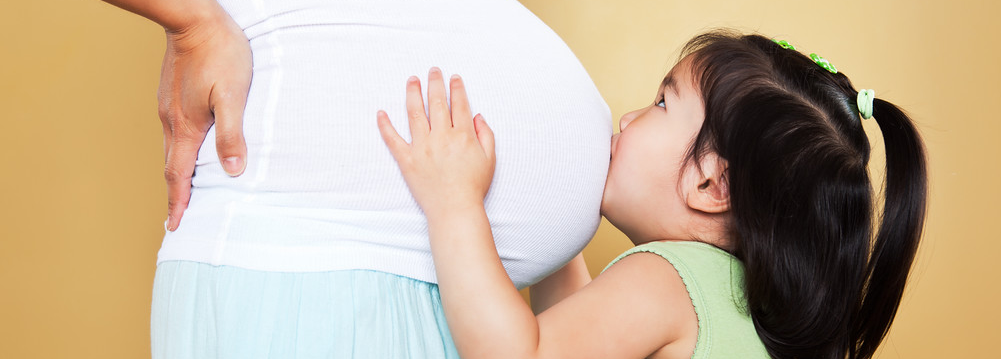Pregnancy and a new baby can bring a range of emotions. In fact, many women feel overwhelmed, sad, or anxious at different times during their pregnancy and even after the baby is born. For many women, these feelings go away on their own. But for some women, these emotions are more serious and may stay for some time.
Depression and anxiety that happen during pregnancy or anytime during the first year after the birth of your baby are medical conditions. These feelings are not something you caused by doing or not doing something. And, they can be treated if you seek help.
What are depression and anxiety?
Depression—feeling sad, empty, and/or “down”—and anxiety—feeling nervous, worried, and/or scared—are serious medical conditions that involve the brain and may occur during pregnancy or after birth.“I felt like I was supposed to be happy because I had a new baby, but I was putting on a happy face for everyone else.” These feelings go beyond what people may experience when they have a bad day or are nervous about an upcoming event. They are also more than “just feeling moody” or having the “baby blues.”
Depression and anxiety may get in the way of doing everyday activities, like taking care of yourself and your baby. They are long lasting and won’t go away on their own. But they are treatable, which is why it’s important to get help.
Are you talking about postpartum depression?
Postpartum depression is one name you might hear for depression and anxiety that can happen during and after pregnancy. But it might not be the best way to describe what women feel.
The word "postpartum" means "after birth," so "postpartum depression" is talking only about depression after the baby is born. For many women, this term is correct: they start feeling depression sometime within the first year after they have the baby.
But research shows that some women start to feel depression while they're still pregnant. You might hear the term "perinatal depression" to describe this situation. The word "perinatal" describes the time during pregnancy or just after birth.
Researchers believe that depression is one of the most common problems women experience during and after pregnancy.
We now know that women may also experience anxiety around the time of pregnancy, beyond just being nervous about having a baby. Anxiety during and after pregnancy is as common as depression and may even happen at the same time as depression. So, you also may hear "perinatal depression and anxiety" or "perinatal mood and anxiety disorders" used to describe all of what women might feel.
No matter what you call them, depression and anxiety that happen during pregnancy or after birth are real medical conditions, and they affect many women.
What are some signs of depression and anxiety?
Women with depression or anxiety around pregnancy tell us that they feel:
- Extremely sad or angry without warning
- Foggy or have trouble completing tasks
- "Robotic," like they are just going through the motions
- Very anxious around the baby and their other children
- Guilty and like they are failing at motherhood
- Unusually irritable or angry
They also often have:
- Little interest in things they used to enjoy
- Scary, upsetting thoughts that don't go away
How common are depression and anxiety during pregnancy or after birth?
As mentioned above, researchers believe that depression is one of the most common problems women experience during and after pregnancy. According to a national survey, about 1 in 8 women experiences postpartum depression after having a baby.
Anxiety during and after pregnancy is as common as depression and may happen at the same time as depression.
You may feel like you're the only person in the world who feels depressed and anxious during pregnancy or after your baby is born, but you are not alone.
What are the risk factors for depression and anxiety during pregnancy or after birth?
Depression and anxiety during pregnancy or after birth can happen to anyone. However, several factors make some women more likely than others to experience one or both of these conditions. These risk factors include:
- A history of depression or anxiety, either during pregnancy or at other times1
- Family history of depression or anxiety2
- A difficult pregnancy or birth experience3
- Giving birth to twins or other multiples4
- Experiencing problems in your relationship with your partner5
- Experiencing financial problems6
- Receiving little or no support from family or friends to help you care for your baby7
- Unplanned pregnancy8
Depression and anxiety during pregnancy or after birth don't happen because of something you do or don't do—they are medical conditions. Although we don't fully understand the causes of these conditions, researchers think depression and anxiety during this time may result from a mix of physical, emotional, and environmental factors.
Can depression and anxiety during pregnancy or after birth affect my baby?
Yes—these medical conditions can affect your baby, but not directly. Early mother-child bonding is important for your baby's development and becoming close to your baby is a big part of that bonding. When you have depression or anxiety during pregnancy or after birth, it can be hard to become close to your baby. You may not be able to respond to what your baby needs. And, if there are older children in the house, they may be missing your support as well.
Early treatment is important for you, your baby, and the rest of your family. The sooner you start, the more quickly you will start to feel better.
Are there treatments for depression or anxiety during pregnancy or after birth?
Yes, there are treatments, and they can help you feel better. Treatment can reduce your symptoms or make them go away completely. Depression and anxiety will not go away on their own. With treatment, there is hope.
Many treatment options are available for depression or anxiety during pregnancy or after birth. Some women may participate in counseling ("talk therapy"); others may need medication. There is no single treatment that works for everyone.
Your provider may ask you a set of questions, called a screening, to learn more about what you are feeling. Together, you can find the treatment that is right for you. Some treatments for depression and anxiety that occur during or after pregnancy are listed below.
Counseling ("Talk Therapy")
Some women find it helpful to talk about their concerns or feelings with a mental health provider. Your provider can help you find ways to manage your feelings and to make changes to help ease the depression or anxiety.
Medication
I wasn't myself for a long time. I wanted to get back to being myself Several medications can treat depression and anxiety effectively and are safe for pregnant women and for breastfeeding moms and their babies. Talk with a health care provider about medications that may be right for you. You can also visit the U.S. Food and Drug Administration to learn about drugs and their possible effects on a breastfed baby.
Is there anything I can do in addition to treatment?
There are some things you can do, in addition to treatment, that may help you feel better.
-
Connect with other moms.
Look for a moms' group in your community or online. These groups may give you the chance to learn from others who are going through or have gone through the same thing and to share your own feelings. Postpartum Support International (PSI)can help you locate groups in your area. Postpartum Progress®
offers a private online community so you can connect with other moms no matter where you live.
-
Make time for yourself.
Do something for you, like getting out of the house, or taking a hot bath without interruption. If you can, have your partner, a family member, or babysitter watch the baby regularly and go visit a friend or run an errand. -
Do something you enjoy.
Whether it is listening to music, reading a book, or watching a favorite movie, take a bit of time each day to do something you enjoy. -
Be realistic.
You don't have to do everything. You don't have to have the "perfect" home. Just do what you can and leave the rest. -
Ask for help.
Don't be afraid to ask for help from family and friends, whether it's caring for the baby or doing household chores. -
Rest when the baby rests.
Sleep is just as important for you as it is for the baby. Sleep when the baby sleeps, during naps and at night. - Be with others.
- Seek out other adults, like family and friends, who can provide comfort and company. Regularly create a special time for you and your partner or for you and a friend to be together.
Can I prevent depression or anxiety during pregnancy or after birth?
Currently, there is no known way to prevent depression or anxiety that occurs during pregnancy or after the birth of your baby. But knowing what signs and symptoms to watch for during and after pregnancy can help you prepare and get help quickly. Here's what you can do:
- Find out whether you have factors that put you at greater risk for depression and anxiety during pregnancy and after birth.
- Talk with a health care provider about depression and anxiety around pregnancy and learn what to watch for.
- Learn as much as you can about pregnancy, childbirth, and parenthood so you know what to expect.
- Set realistic expectations for yourself and your family.
- Do things in addition to seeking treatment that may help you feel better.
- Plan ahead. While you're pregnant, think about who can give you support and help when your baby comes. Talk with that person about helping you so that you can both prepare.
Remember, depression and anxiety that happen during pregnancy or after the birth of your baby are not things you cause—they are medical conditions that require medical care.


 Citations
Citations
 BACK TO TOP
BACK TO TOP